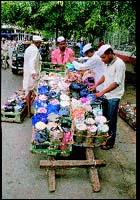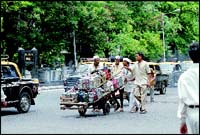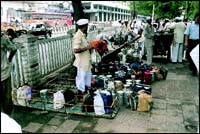


|
|
|
What most symbolises Bombay? Not the historic Gateway of India immortalised on a million postcards or even the Gothic, gargoyled Victoria Terminus (now known as Chhatrapati Shivaji Terminus). For me, Bombay is the dabbawalla, the daughty little man in distinctive white Gandhi cap, who delivers thousands of hungry lunches to officer-goers every afternoon. The dabbawalla gets his name from the dabba, the aluminium containers fitted one above the other, held in place by a wire grip and lowered into an outer tin case, which serves the double purpose of keeping the food warm and preventing it from splashing out during the dabbawala's rushed and jostling journey. He carries about 39 of these dabbas on an unwieldy, long tray, a combined weight of more than 50 kilograms, on his head as he moves speedily through sweaty miles and cramped trains. His world is one of rush, rush, run, propelled only by a single thought: whatever happens, get the lunches delivered in time. The fact that makes Bombay's dabbawalla system unique and incredible is the complexity of the task and the simplicity of its operation. It is not a set-up where an individual man delivers one or even five lunches. It is a gargantuan service in which some 2,000 men carry over a hundred thousand dabbas every day across the city's 60-kilometre sprawl in an inter-woven relay with each dabba changing hands at least four times. Yet, for all its intricacy and size, it is unerringly run by a group of simple, illiterate, one-time peasants using nothing more than a handful of symbols crudely painted on the lunch boxes � that, and their own intuition and team work. Eight out of ten white-collar workers in Bombay live too far from their office to go home for lunch. A restaurant meal costs five to fifteen times more than home-food. To them, the dabbawalla brings the security of a cheap, clean, tasty and often still-warm, home-cooked meal.
The outer case of Mohile's dabba is marked with a black swastika, a red dot, a yellow stroke. Each symbol marks a different stage of the dabba's odyssey from Mohile's flat to his office and back. The dabbawalla reads the hieroglyphics like a sentence. But as one man on the beat said, �We often recognise a dabba by its feel, like we would a familiar slipper.� Mohile's dabbawalla knocks precisely at 10 and he isn't wearing a watch. He grabs the dabba from Mrs. Mohile and sprints down the three flights. His daliy beat covers 35 boxes spread over 20 square kilometres. Each box has different marking as each is bound for different destinations. At exactly 10.20, he has a rendezvous with dabbawalla No. 2 who takes over all the swastika-marked boxes he has collected from other couriers, pedals off to the suburban rail head of Dadar. Dabbawalla No. 1 continues picking up dabbas meant for other pick-up men. At Dadar hundreds of dabbas have been deposited by different collectors. From them, dabbawalla No. 3, swiftly and unerringly, picks out all the ones with a red dot, Mohile's included. He loads his consignment on a �tray�, an unwieldy wooden crate 2.5 metres long and less than a metre wide, just the right size for 39 dabbas to fit snugly in rows of three. He heaves the tray on his head and runs to the platform just as the train clacks in. Within the two-minute halt, he must elbow his way in through the narrow compartment doorway with his heavy head load, along with some 25 office bound commuters and half-dozen other dabbawallas, all in as great a hurry as himself. Bombay alone can sustain a dabbawalla network of this size and complexity because it alone, among Indian cities, has a quick, efficient and farflung suburban railway service. Mohile's dabba is now one of thousands riding the train from all over the suburbs, but the yellow stroke on its lid tells its destination: Victoria Terminus. Different marks on other dabbas tell the career at which stations en route he must pass them on to other waiting links in the crosscross network.
Mohile pays only Rs. 35 a month for this service. Rates vary, the difference depending not on the distance from the house to the office, but on the distance the dabbawalla has to walk to and from the nearest suburban station. However, rarely is the fee more than Rs. 50. With the sheer size of the operation and the nerve-racking rush, surely, the dabbas get mixed up. In a country with rigid food taboos, this could be disastrous. Krishnan, a staunch vegetarian South Indian brahmin, recalls how he opened his dabba one day hoping to see fluffy, snow white rice and instead found half a fried fish staring back at him. �I couldn't look at food for a week without that wretched fish head swimming up before my eyes,� he remembers with a shudder. But such instances are rare. Not so infrequent is the loss of dabbas, about 10 to 15 every day. Some have merely gone astray and are soon traced. But some are stolen. In this case, the owner is paid back half the price of a new lunch pail. In a dabbawalla's tray, a brahmin's rice jostles along with a low-caste chapati; a Hindu's vegetable curry with a Muslim's mutton korma � thus, in a way, the dabba system dissolves the barriers of class, caste and community which haven't been entirely demolished from Indian society. The man who carries the dabba is not his own master. He is the �servant� employed by one of the city's 635 mukadams or contractors, ex-dabbawallas themsleves or even still plying the beat. It is they who orchestrate the whole system. They, in turn are answerable to their guild, The Bombay Tiffinbox Suppliers Association. Apart from the daily hardship, the dabbawalla is exposed to constant hazards: a slip from the doorway of a crowded, speeding train, juggernaut buses elbowing his fragile bicycle into the gutter in a bid to prove that might is right, a car not caring that he cannot cross the road too fast with his cumbersome headload. Some months ago, a dabbawalla waiting on his bicycle at a traffic light was hurled off the road by a lorry gone berserk and was smashed to death. Yet, even in such an extreme situation, his quota of dabbas was delivered. News travels fast on the network. The mukadam got to hear of the accident within minutes and contracted the secretary of the Association (who patrols the city for just this kind of emergency), asked him to look after the police formalities, collected the dead man's dabbas, and being familiar with the symbols, got them to their destination � just 30 minutes late. Bombay's salute to its dabbawalla's, as you see, is well deserved. The job, never a cushy one, gets even worse during the city's notorious monsoon when rains lash the metropolis for days without let-up, flooding railway tracks, paralysing the trains � and thus the dabbawallas. A contractor proudly tells of how his �boys� think nothing of getting down on the flooded tracks and walking a few extra kilometres in the lashing rain with their head loads so that they can keep their rendezvous with the contract men at the terminus.
Most of Bombay's dabbawalla community comes from Pune, some four train hours away from Bombay. Other dabbawallas have an explanation for this. At the turn of the century, some enterprising villagers from here went to Bombay in search of better livelihoods. They discovered that a hardy but illiterate man could be nothing but a coolie of sorts. They carried any kind of load, and some specialised in lunch-boxes. It was only natural that the next man to leave the village would come and stay with his relative in the city, and as natural that his kinsman would induct him into his own profession. Thus gradually the business became the monopoly of families from this region. The Association, too, is a binding force. It helps out with accidents, as we saw earlier, and in brushes with the law. �One of the dabbawallas left his railway pass at home and, sure enough, the ticket checker chose that day to ask for it. A general secretary patrolling that particular beat got to hear of the incident and rushed to the station to sort out the matter so that the dabbawalla could get on with his job,� explains an office bearer. He adds, �Sometimes we take the help of the police in tracking organised gangs of dabba thieves. But you know what the law is like. It only complicates matters. As far as possible we handle such things by ourselves. Our men are everywhere, and they soon get to know the whereabouts of the crooks.� I met one of the oldest men on the beat, K.G Balekar, who has been delivering lunches since 1931. He recalls a cleaner, uncrowded Bombay in which �it was sheer joy to work�. And they are still running, the size of the operation growing with the increasing sprawl of Bombay. �It can be worthwhile. If you work hard and honestly you can build up a good clientele and then start hiring servants and expand the business. My mother, sister and I are now in partnership with 15 employees. I have slogged like a donkey all my life, but I have given my son an education. I wanted him to be able to wear a clean shirt every day and sit in a nice air-conditioned office. He learned shorthand-typing and an officer, whose dabba I have been carrying, gave him a job.�
|

Home Page
About the mag
Subscribe
Advertise
Contact Us
 The Dabba Connection
The Dabba Connection
 Let us tail the dabba of Ram Mohile, a typist with the Bombay Municipal Corporation, on its daily adventure from kitchen to office canteen. Mrs. Mohile starts cooking at 7 a.m. to prepare her husband's mutton curry, rice, vegetables and chapati. She packs them in the dabba.
Let us tail the dabba of Ram Mohile, a typist with the Bombay Municipal Corporation, on its daily adventure from kitchen to office canteen. Mrs. Mohile starts cooking at 7 a.m. to prepare her husband's mutton curry, rice, vegetables and chapati. She packs them in the dabba. At Victoria Terminus, the hub of commercial Bombay, Mohile's dabba enters the last phase of its journey. Dabbawalla No. 4 waiting on the platform, picks it out together with other boxes marked with his symbol, the white cross. The black circle on Mohile's case indicates its exact destination: the BMC Building. By 12.30 he has carried his crate up four flights of stairs and left Mohile's lunch-box along with some 20 others in a corner of the canteen. Mohile, coming in at 1 p.m. will recognise his dabba from his name on an attached tag.
At Victoria Terminus, the hub of commercial Bombay, Mohile's dabba enters the last phase of its journey. Dabbawalla No. 4 waiting on the platform, picks it out together with other boxes marked with his symbol, the white cross. The black circle on Mohile's case indicates its exact destination: the BMC Building. By 12.30 he has carried his crate up four flights of stairs and left Mohile's lunch-box along with some 20 others in a corner of the canteen. Mohile, coming in at 1 p.m. will recognise his dabba from his name on an attached tag. The dabbawalla's hardships are not confined to their jobs. In the city's impossible housing problem, most of them are forced to leave their families behind in the village and see them twice or thrice a year. They live in cramped, slum ghettoes. They, who go through so much to deliver hot meals to hundreds, have time only for a hurried chapati and a few morsels of vegetable wrapped in a newspaper and brought from home. Like their clients they cannot or will not eat in restaurants.
The dabbawalla's hardships are not confined to their jobs. In the city's impossible housing problem, most of them are forced to leave their families behind in the village and see them twice or thrice a year. They live in cramped, slum ghettoes. They, who go through so much to deliver hot meals to hundreds, have time only for a hurried chapati and a few morsels of vegetable wrapped in a newspaper and brought from home. Like their clients they cannot or will not eat in restaurants.